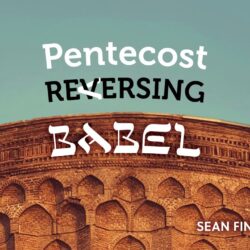This is part 3 of our holy spirit series.
Do you know what I don’t hear enough of today? Dialogue–honest-hearted, biblically-informed, respectful dialogue. So often we silo ourselves off in echo chambers with our doctrinal comrades, occasionally lobbing malotov cocktails at the other side, never taking the time to understand them, much less ask the question, “Could I be wrong on this?”
My goal here in this holy spirit series is to get various perspectives out there. We heard John Truitt a couple episodes back make the case that the gifts of the spirit are available to all Christians today while Greg Deuble explained why he believes tongues have ceased even though the other gifts remain. Today (and next week) the two of them are going to engage–not as sworn enemies, taking cheap shots at the other side, but as brothers who agree on way more than they disagree.

—— Links ——
- More about John Truitt’s ministry: Allegiance to the King
- More about Greg Deuble’s ministry: The Bible Jesus
- Here’s Deuble’s article, “Testing, Testing, One, Two…Nine!“
- If you’d like to support Restitutio, you can donate here.
- Leave a voice message via SpeakPipe with questions or comments
- Intro music: Good Vibes by MBB Attribution-ShareAlike 3.0 Unported (CC BY-SA 3.0) Free Download / Stream: Music promoted by Audio Library







I was interested in this discussion, having been through much disruption in my fellowship in my teens with the subject.
A point I thought that Greg didn’t answer properly, was if tongues had more than one purpose why would it cease when only one has been completed?
I would say that it would indicate that the gift had a primary purpose, as a sign. The sign was carried out by the church for the secondary reasons, as they’d needed a reason to be giving the sign. IE it was edifying for them when used properly.
If the primary prophesied purpose was as a sign to Israel that the old testament was ending, then it would end at the removal of the sacrifice in Jerusalem.
The church still had other ways to edify itself.
Hi Sean, been following your podcast for years and have enjoyed them. Keep up the good work! One assumption that never seems to be addressed is, “why do we assume that the Apostle Paul’s words on the gift of the spirit are applicable in our time today?”. Indeed, since Paul is clearly addressing the Corinthian congregation in his time on this issue, one could postulate that if he meant his comments to apply for all time to all Christians, he would have said so as Jesus did? I have never seen anyone approach this topic without this assumption. However, I believe you achieved an interesting goal in having multiple Christians of different views talk on this topic without “right fighting”.. It was a pleasure to listen to… Thanks again. Anthony
Anthony, here’s a few thoughts in regards to your question. At the end of 1 Cor 14 Paul says that the things he writes are commandments of the Lord. Why would they only be commandments to the Corinthians? That doesn’t really make sense. Also Paul relates the orderliness of prophecy in conjunction with discerning of spirits as something that prevents confusion in all the churches of the saints. Finally, Jesus is the one who said he would send us the spirit and Peter says that the spirit would be poured out on all believers and they would all prophesy. There’s much more that could be said on this subject including demonstrating other instructions to the Corinthians that we would certainly apply to the rest of the church (e.g. divisions because of social caste are bad).
Thank you very much to the three of you. I am finding this series very interesting. At the end of this podcast, it sounded like the first of Greg’s two questions was pretty much exactly the question that I wanted to ask. If the “tongues” spoken by John and his church, are not a “heavenly prayer language,” what are they? Are they an unlearned foreign language, like Mongolian, Basque or German, say, for someone who hasn’t learned it? Amid his explanations to overcome the “baggage” of Pentecostals, I didn’t get the impression that John really answered this question; at least not in such a way that I am clear as to the answer.
David, yes that is correct. It’s an actual human language that the person speaking does not understand. And the vast majority of the time the people listening don’t understand either which is why the person speaking needs to pray to receive and then give the interpretation. Hope that helps! Happy to answer any questions.
Thanks, John. Have you or any of your fellow worshippers ever been able to identify what language you or one of your fellow worshippers are speaking; or what family of languages it comes from (Germanic, Latin, Slavonic, Celtic, Semitic, Oriental etc)? Do you think you always speak the same language, or do you speak different languages?
I have always spoken in the same language but my wife appears to speak in several different ones. I’ve never personally been in a situation where someone understood the language being spoken but I know people who have. As far as the language group I’ve been told more than once that the language I speak in sounds Native American.
Dear John;
Two questions
1. Does your glossolalia have a genuine linguistic structure ? Would it greatly affect your Christian faith if it scientifically turned out that it didn’t ?
2. Was your initial glossolalia accompanied by any profound, preternatural, spiritual experience ?
John Bradley, I’m not a linguistic expert so I can only say that it sounds like a language to me and to those that have heard it including those that are skeptical about tongues. The answer to your second question in item 1. Is no for multiple reasons. In the first place I, like the Bible, place an emphasis on prophesying among the gifts of the spirit and I have had plenty of times where the information was something the person speaking couldn’t have possibly known without God as well as times where the information was about unforeseeable future events that subsequently came to pass. It doesn’t take very many of those to, as Paul would say in 1 Cor 2:5, have your faith rest on the power of God. Another reason is that I know too much about the word “scientifically” to know that is an all too often abused term. But that would take much more explanation than I can put here.
On number 2, no just a lot of prayer. It was on my own, in my room, quietly praying, without anyone pressuring me. God is typically in the still quiet voice not the whirlwind.
I hope I answered your questions. I’m happy to clarify if I haven’t.
Thanks for your fiurther comments, John (Truitt).
Exactly what New Testament ‘prophecy’ was is a matter of some scholastic uncertainty.. Some would say that Paul uses the term more in the sense of ‘preaching’.
Did you have the gift of ‘prophecy’ before you acquired the gift of ‘tongues’ ( = ‘languages’) ?
Thanks, John. That’s interesting. Do you know any Native Americans, who speak any of the languages?
John Bradley,
No I spoke in tongues many years before I prophesied.
God Bless!
John
Good job
Question: What do you do with Jude 3? If prophecy is still open.Passages like: Test the spirits, and finally 2 Peter 1:20.
Thx Br.Kent
Was the Psalmist a cessationist, was his faith weak, did he put “God in a box” when he bemoans the fact that there were no more signs, no prophets in the land (Ps 74:9)?
Hi Carlos
This comment is a year and a bit late, but hey I just started working through these podcasts and we cant all be there on the day they are posted. LOL
I would say the psalmist may wonder if he is a ceasationist, or he might make a decision to be one, but much more likely this is a prophetic word pointing at himself and his people and amplifying the common thread that Israel had departed from their first love, and were suffering the result of that. So therefore is what we see in the body today a similar scenario and we have found ourselves powerless in the land for similar reasons, claiming a type of godliness but denying the power of it.
I feel that is what you are implying with your witty question?
I wonder if this text box is still relevant as it is a year and a half later.
So much of what John is saying rings true to me and my experience. I am in New Zealand, was part of an AOG church when first saved and onwards for the next 30 years. In that time I experienced a lot of this with manifestations, prophecy, words of knowledge, and tongues in myself, in the first couple of years but the church slowly was populated by ex baptist folk who were not happy with manifestations, so the group slowly morphed to a sort of charismatic baptist one, clappy and buzzy without the manifestations. Me and the few left like me just wandered off. I since became unitarian, have no fellowship, and those early experiences are still so vivid and I speak in tongues easily still, but due to my unitarianism I have no where to fellowship any more so can not use prophecy any more. (because there is no group to hear Gods message to any other individual.
I hear so much strange understanding here, especially from Greg,and some of the comments, and can only wonder at the elephant in the room. Does no one see it? Paul simply tells us, Tongues is used to give thanks direct to God by the individual and so does not need to be interpreted unless it is issued in the assembly, when it should be interpreted so as to bless the other listeners. to build up the church. Thats why Prophecy is so much more important.
I can not usefully seek prophetic utterance any more, because I have no one to hear it. But I can still speak in tongues.
However the elephant in the room is the word “gifts” in 1Cor12:1, which is NOT in the original Greek. Easily proven. Meaning that these things are manifestations of the one gift, that of the holy spirit within the believer. Read it again without that “gift” word in your mind and it stands out clearly. Why has no one brought out the clear teaching of John Schoenheit here???? The giver the gift and the manifestation.
I heard it while researching this very subject for a baptist woman who challenged me, and it was easily seen in the original greek and it sent me looking for what other issues were misunderstood!! It turned me into a unitarian !!!! It was so clear and stunning I had a real sea change in this, and it led to a complete change in my theology and a clearer understanding of these manifestations. i.e. it still works, God didnt take anything away.
This subject is so important and therefore is so divisive and misunderstood. So many are denying the power of the spirit within and making excuses and “therefore equals” statements to avoid doing what Paul clearly explains what should happen in a meeting of believers. I think this is why the trinity error got into the body, because of denying the direct connection with the spirit, that Paul clearly had and the early church exercised. Mans fears and doubts entering into the exercising of the power of the spirit.
I been listening while typing this and now Greg is saying the old “done away when the perfect comes” and it hurts me, so silly Greg. The perfect has not come! it wont come until Christ returns! I knew this one while still a trinnie, and it is doing that same “therefore equals” that trinitarians do to support their error. so sad bro.
Hi, Ken.
Perhaps Greg meant “It is strongly implied by Scripture.”
When the Apostle James, the son of Zebedee, died in 44 CE, there was no attempt to replace him, as presumably would be the case, if there were to be an ‘Apostolic succession of Apostles’.
Hi, Ken;
I was water baptized in an Assemblies of God Pentecostal Church, but I never practised glossolalia.
How did first begin to speak languages/tongues, Ken ?
I would add another comment in wanting clarification to something Greg says about 4 minutes into this podcast. I am currently running through the podcast a second time to see if I can see the logic in the two points of view.
Greg says “it is clearly taught in scripture that the office of an apostle has ceased” and I would like to know where in scripture this is easily seen, because I cant think where this is, I have not noticed it!
This statement Greg apparently uses as the basis for his assertion that certain apostolic signs have vanished along with the Apostles. Could it be that when the church centre moved from Jerusalem/Antioch, to Alexandria, and the Hebrew roots in early church were lost to Greek philosophy, that the office of an apostle was lost by neglect, by wrong base beliefs and introduced paganism?
So where is this verse or chapter Greg? (I will also email Greg and ask him directly Sean, so no need to chase him up for my sake)